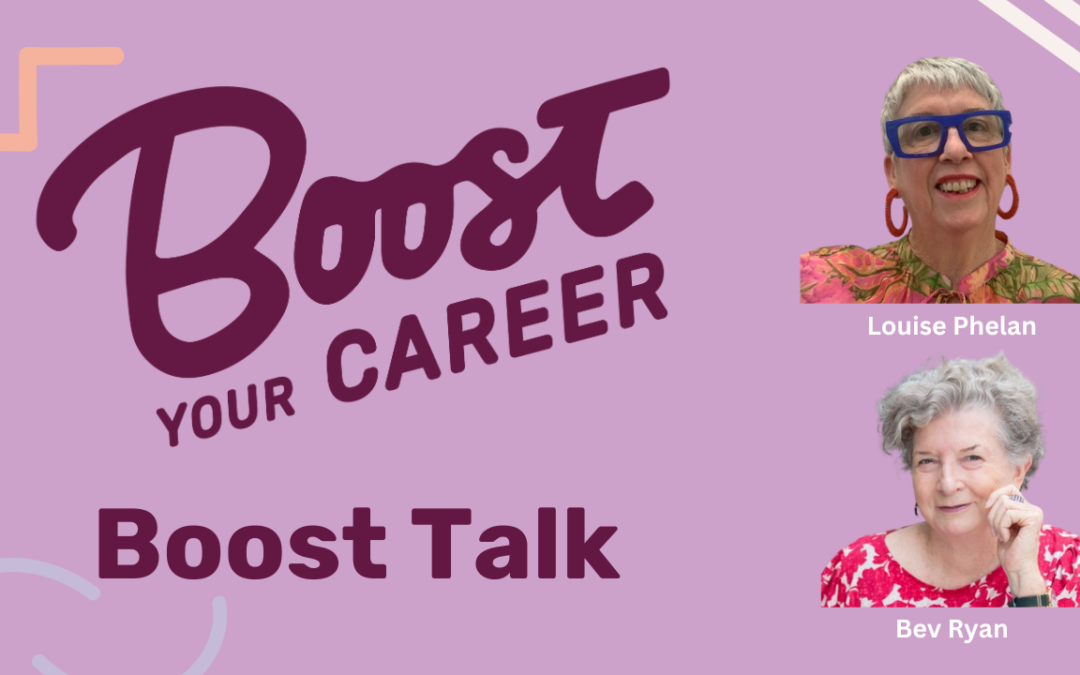I was so excited to speak with Louise Phelan on her wonderful podcast, ‘Boost Talk’ in 2024. Turns out, we did well, speaking about women releasing their own remarkable in various ways.
Louise and I have a common interest in professional development for women – and we found we have a common love of the work of author and career counsellor, Barbara Sher, who also helped people write and publish books.
About Louise: “My passion lies in unlocking performance potential and supporting women to meet and exceed their objectives in life and at work. My goal is to put their career success back where it belongs – in their own, safe hands.”
My own passion is helping women release their remarkable in books. And valuing their middens.
Correcting myself in the video – I mentioned Madonna King when I should have named Kath Noonan as the author of the original article about middens. I also wrote an article in homage to hers – ‘Your Treasures Underfoot‘. This is one of Kath Noonan’s gems:
“By definition, a midden contains the debris of human activity. Basically a muck heap. We all have our own personal midden. The leftovers and fallout of all our interactions and choices and relationships. It’s the debris of our life lived so far. Your midden isn’t your burden. It’s what you stand on. The rubble of life. The foundation. It’s underfoot. Almost a scaffolding.”
As I read ‘Last Word’ that day my scaffolding suddenly felt firm under my feet. I also felt the height of experience, the advantage of aging – a clearer view of life and a deeper trove of treasures to draw upon.
In my conversation with Louise, we also spoke about a few interesting points about women and publishing from Brooke Warner, CEO of She Writes Press, and author of ‘Write on Sisters’:
- Women writers have their lives reviewed while men have their books reviewed
- Women memoirists are diarists while men memoirists are brave
- Women write nuanced believable male characters while men don’t do the same for female characters
- Women writing about an issue are seen as writing for women – men writing about an issue are seen as writing for ‘everyone’ – example page 58
- Women who submit manuscripts are penalized for their gender while men get the green light – page 59
Brooke also writes: “Women crave to know they are good enough and to feel they deserve attention and respect. Women writers crave this even more. To do that, they have to let themselves be deeply seen.”
To me, ‘finding your voice’ means
– knowing what is going on around you and beyond
– using your own informed mind and moral compass as a guide
– having the confidence to express your thoughts
– having the language to express your thoughts
– being in a role where your strengths are amplified
That voice may be best used verbally or in writing – or another format (eg cartoonists, artists, filmmakers)
In closing, if you are searching for your place, your passion, your people, your passage, your payload, your patina, take an archaeological dig in your own midden. What treasures lie there?
What do you have to share that will shine a light for others?
What beautiful wisdom can you bring to your book, as you bare your soul in your carefully selected words?
What can you offer an employer that a less experienced person could not possibly provide?
What story can you tell that lets your audience know they are not alone?
What beautiful new thing can you create from your past?

